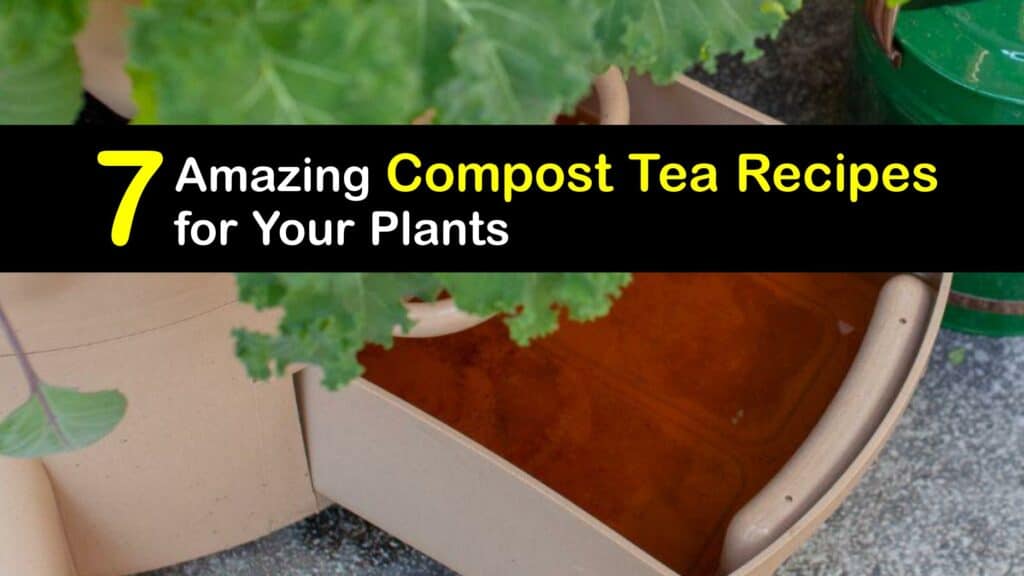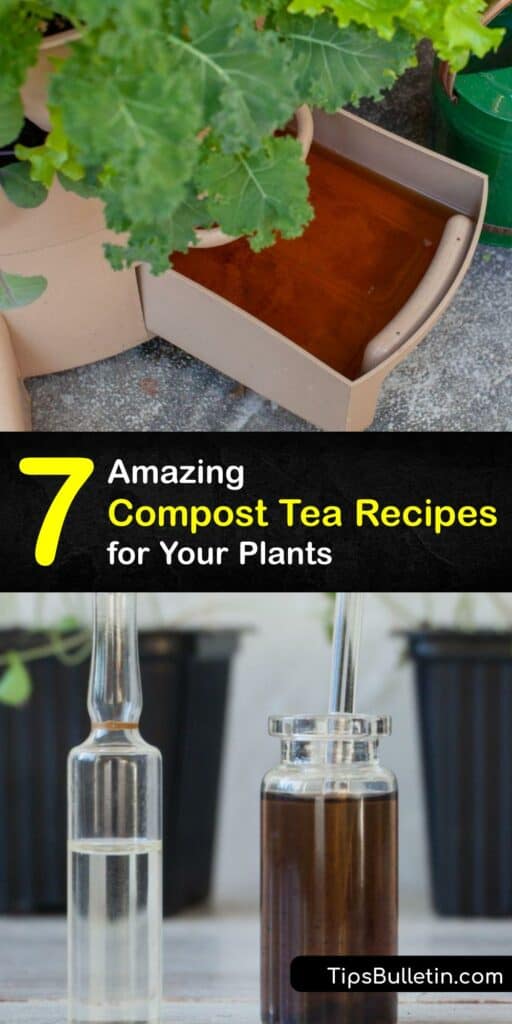It’s no secret that the key to a healthy garden is proper nutrition through fertilizing your soil. Fertilizing your garden is essential not just to grow large and delicious fruits and vegetables, but healthy plants fend off disease and pest damage better than stressed plants. Discover the power of compost tea and compost tea recipes to use in your garden.
Compost tea is a type of liquid fertilizer full of beneficial bacteria and fungi to help plants grow. Compost tea may also contain other beneficial microorganisms like nematodes. Despite its name, many gardeners refer to compost tea as compost beer due to the process of creating it being closer to fermentation than making tea.
There are two main methods for creating compost tea for plants. The most common ways to brew compost tea fertilizer at home are by soaking compost in water to create a liquid fertilizer. The other option uses oxygen to create aerated compost tea.

Compost Tea for Plants
Gardeners love compost tea as a fertilizer for helping plant growth because it offers nutrients for your plants without a lot of work.
While adding compost to your garden is an excellent way to amend soil quality, the decomposition process takes time. Commercial fertilizers contain chemicals that aren’t beneficial to the environment – compost tea combines the two.
Note that there is a big difference between compost, manure and fertilizer when talking about what is beneficial for plants.
Basic Compost Tea Recipes
The basics of making compost tea for your garden involve a container for brewing your tea, fabric for straining out solids, and water. The specifics of making compost tea vary by technique and available supplies, but a vital step is to use rainwater or non-chlorinated water. Let tap water sit for a full day before using it in your tea.

The easiest way to set up a compost tea brewer is to line the bucket with an old pillow case or mesh fabric and secure it to the edge of the bucket with clamps or string. Add inoculant, an ingredient that encourages the growth of beneficial microbes in the bucket.
The research behind microbe organics looks to understand the use of microbes in soil with plant amendments. Standard inoculants include finished compost and worm castings separated from a worm compost pile.
Making Compost Tea for Tomato Plants
Although basic compost tea for vegetables works for various plants, if your garden suffers from nutrient deficiencies, amending your compost tea with specific items helps target particular issues. Note that there is also a DIY way to make worm casting tea for your veggies, ornamentals, and flowers.
Tomatoes are one plant prone to suffering from blossom-end rot due to a lack of calcium in the soil. A compost tea recipe for tomatoes includes humic acid, which aids soil in nutrient uptake, and liquid bone meal to increase the calcium in the soil.
Line a 5-gallon bucket with fabric or pillowcase to act as a tea bag for your compost. Fill the bucket with the ingredients and add water the rest of the way until it fills the bucket. Stir the compost once or twice a day for two days until the tea is ready.
If you don’t have access to compost, put eggshells in water for plants in much the same way. Eggshell water adds calcium to plants. Most plants also benefit from baking soda sprinkled on the surrounding soil.
Bacteria Compost Tea
Compost tea is either dominant in bacteria or fungi. Whether bacteria or fungi are more prominent in your compost depends on the food source used in the compost. Bacteria require proteins and simple sugars, best provided by adding molasses to the compost.
Mix the ingredients with water inside a liner, stirring at least twice a day, and allow it to brew for three days. Compost tea that is heavy in bacteria works well for many vegetables and grasses.
Fungal Compost Tea
Like fungi in nature, the fungi in your compost enjoy attaching to the compost ingredients as they grow. Compost tea dominant in fungus is best suited for perennial plants, berry shrubs, and trees. The best compost tea recipe for plants that prefer fungus involves complex sugars from fish hydrolysate, kelp meal, and humic acid.
The key to making the best fungal compost involves aerating the tea using an air pump without turning the compost itself. Because fungi enjoy growing on ingredients, turning the solids in the compost disturbs the fungi.
The goal of leaving the fungi undisturbed is so that when you spread the tea across the soil, every portion of the tea contains fungal life to benefit your plants.
Making Compost Tea for Lawns
To help grow a healthy lawn, amend the soil with compost before sowing grass seeds allows your lawn to get off to the best start. Creating a tea recipe for lawns is simple, and your yard remains green and healthy with regular treatments.
To make the best compost tea for lawns, start with compost that includes food scraps and brown organic matter for compost like hay and dried weeds. Organic kitchen waste is good for compost as long as it doesn’t contain meats or oils.
These sample ingredients are ideal for creating a bacteria-dominant compost that grasses thrive on. After making compost tea for lawns in a bucket, mix more water to create a weak tea to make a natural fertilizer for herbs or to use as a soil drench for the lawn.
How to Make Compost Tea for Fruit Trees
Nitrogen is a crucial nutrient for plants to have healthy growth. Without enough nitrogen, plants develop pale yellow-green leaves with slow growth. Nitrogen creates green leaf growth needed for plants to gather energy for fruit production.
With a compost or vermicompost base, include specific ingredients to provide nitrogen to your developing fruit trees. The best additions to a nutrient tea for nitrogen are plants with long root systems. Clover and alfalfa plants are known as nitrogen-fixing plants and are common additions to nitrogen compost teas.
Pouring nitrogen compost tea onto the soil as a drench is one method to allow your fruit trees to absorb the nutrients. Adding the tea to a tank sprayer allows you to treat your plant with a foliar spray to add nitrogen to your plants.
Creating Aerated Compost Tea
The most significant difference between regular compost tea and aerated tea is that the latter is rich in oxygen. Gardeners aerate their compost tea through various techniques; some use air stones to generate small bubbles inside the tea; however, many gardeners debate an air stone’s effectiveness at agitating the microorganisms.
For proper aeration, use an air pump to create enough bubbles to break the water’s surface, which resembles a rolling boil. The air pump must remain on while your compost brews to make good compost using the aerated method.
Other Kinds of Gardening Teas
Aside from using compost, there are various organic materials gardeners can use to improve the quality of the soil. Many of the best materials to amend your soil come from around your home.
The production of plant tea comes from soaking plants in water to extract nutrients like nitrogen and calcium. Dandelions, seaweed, and grass clippings are some of the best options when making plant tea. Vegetable scraps, tea leaves, and even weeds pulled from your yard have nutrients that benefit your garden.
Manure tea is a popular choice for farmers, made from the fermented manure of non-meat-eating animals. It’s the best natural fertilizer for vegetable garden areas. Like making compost tea, aged animal manure is collected in a porous material, submerged in water, and allowed to steep.
Here, you can read more ways to make manure tea; the benefits of making compost tea go beyond supplying your garden soil with nutrients. Good compost tea grows beneficial fungi and nematodes, which help defend plants in the garden from harmful microorganisms in the soil.
Using compost tea in your garden helps plants grow faster, produce better yields, and protect plants from various pests and diseases.

If you learned practical compost tea recipes from our guide, please share our tips on making compost tea for plants with your gardening friends on Facebook and Pinterest.